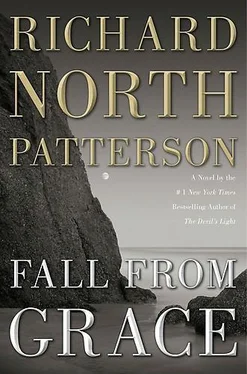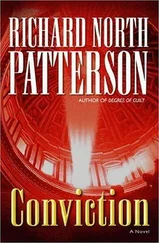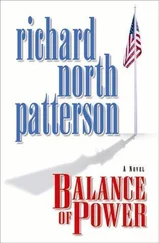Richard Patterson - Fall from Grace
Здесь есть возможность читать онлайн «Richard Patterson - Fall from Grace» весь текст электронной книги совершенно бесплатно (целиком полную версию без сокращений). В некоторых случаях можно слушать аудио, скачать через торрент в формате fb2 и присутствует краткое содержание. Жанр: Триллер, на английском языке. Описание произведения, (предисловие) а так же отзывы посетителей доступны на портале библиотеки ЛибКат.
- Название:Fall from Grace
- Автор:
- Жанр:
- Год:неизвестен
- ISBN:нет данных
- Рейтинг книги:5 / 5. Голосов: 1
-
Избранное:Добавить в избранное
- Отзывы:
-
Ваша оценка:
- 100
- 1
- 2
- 3
- 4
- 5
Fall from Grace: краткое содержание, описание и аннотация
Предлагаем к чтению аннотацию, описание, краткое содержание или предисловие (зависит от того, что написал сам автор книги «Fall from Grace»). Если вы не нашли необходимую информацию о книге — напишите в комментариях, мы постараемся отыскать её.
Fall from Grace — читать онлайн бесплатно полную книгу (весь текст) целиком
Ниже представлен текст книги, разбитый по страницам. Система сохранения места последней прочитанной страницы, позволяет с удобством читать онлайн бесплатно книгу «Fall from Grace», без необходимости каждый раз заново искать на чём Вы остановились. Поставьте закладку, и сможете в любой момент перейти на страницу, на которой закончили чтение.
Интервал:
Закладка:
“More than that. I have an existence no one in my family can imagine. I’ve developed this distance-physical and emotional.” Adam paused, trying to explain a sensation foreign to almost everyone he encountered. “I’ve learned to split off from the past, or even what’s happening to me in the moment. In effect I’ve become a different person, who can stuff even the worst experience until it’s time to face it.”
Glazer regarded him closely. “And now your father’s dead, and you’re ten years harder. And coming back has forced you to confront the reasons that you left.”
“So it seems. I’d like to exhume the past, then bury it for good. At least to the extent I can.”
Glazer hunched in his chair, blue eyes fixed on Adam. “And that racing season was the catalyst, you believe.”
“For both of us. Without that, I’m certain, I’d have gone back to school and become a lawyer.”
“And married Jenny?”
Adam closed his eyes again, his voice lower and quieter. “I’ll never know, will I? All I’m sure of is that one summer on this pond changed everything.”
In Adam’s understanding now, the annual competition for the Herreshoff Cup caught the primal essence of his father: a ruthless competitive drive, an ineradicable class envy, the lust to subordinate other men. The novels, the accolades, the women-none of that was enough. There was also the battered silver trophy with a half century of victors engraved on its side. By 2001, Benjamin Blaine had stamped his name on it seven times; this summer, as before, the cup sat on their dining room table like a prize of war.
From his father’s earliest memory, Adam knew, he had been captivated by the sight of these gaff-rigged boats, so perfect in design, racing one another on the pond from which his drunken father had extracted lobster-at once a wondrous spectacle, a privilege of wealth, and a contest between competitors stripped of all excuses. As a youth, Ben had begged his way onto the boat of a wealthy man, Clarice’s father; as a man, he had bought her father’s house, then his Herreshoff-the boat he had always craved, a wooden-hulled classic from the early 1900s, as beautiful as it was balanced. With what seemed an act of fraternal generosity, but which Adam now perceived as malignant perversity, his father had purchased a companion boat for Jack. So that every summer, on these same waters, Ben could remind his older brother of which man had transcended Nathaniel Blaine.
The occasion was the summer races sponsored by the Menemsha Pond Racing Club, a preserve of skilled sailors who, quite often, were also celebrated as actors, writers, musicians, and lions of industry or Wall Street-or, for several seasons, a scientist and a doctor who had both won the Nobel Prize. As a teenager, Ben had crewed for affluent Brahmins; in adulthood, he had recruited Adam to race with him against Jack and Teddy. The stated reason was to give Jack the oldest and most experienced son. But, again and again, Ben and Adam prevailed. Against his deepest inclinations, Teddy sailed on with great determination, unwilling to beg off. Perceiving his brother’s silent humiliation, Adam understood Ben’s real purpose-to show Teddy that, like Jack, he did not measure up to his younger brother. So it was Adam who, at twelve, had refused to extend the fraternal rivalry.
After this Ben had sailed alone. It became his pride that, without Adam, he could outrace men who had devoted their lives to sailing. Not until 2001 did Adam sail again-this time against his father.
On the surface, this had come about by accident. Adam had gone on one of his uncle’s practice sails, two weeks before the racing season began and a day after he had played mind games with his father on the eighteenth hole at Farm Neck. The story had reduced his uncle to laughter, eyes bright with merriment and a rare touch of malice. “Wish I’d been there,” Jack remarked. “His face must have been a study.”
Adam grinned. “In granite. I’m afraid I didn’t let the moment pass without remarking on the aging process. All he could do is express the pointless wish that I’d race him in a boat that I don’t have.”
Glancing at the mainsail, Jack adjusted the tiller. At length, he said, “There’s always this one, Adam. Maybe you should take my place.”
“Why?” Adam asked in surprise. “You’ve been racing this forever.”
“And losing. It’s pretty clear that I can’t beat him. Now it’s your turn to try.”
Adam felt a stab of doubt. “I’m not sure, Jack. You know how he always needs to be top dog-even within this family. Won’t that create another problem for you both?”
Jack shrugged. “Maybe for him. But what can Ben say? That he’s afraid you’ll beat him for the Cup?”
“I can’t beat him,” Adam said flatly.
“You can, though.” Facing him, Jack said with quiet conviction, “I’ve watched you sail, summer after summer. You’ve learned more from him than either of you know-and a bit from me as well. Now you can teach him how to lose.”
Listening, Glazer touched a finger to his lips. “Did you understand how provocative that was? Your father buys Jack a boat so that Ben could keep on beating him. And instead your uncle enables Ben’s own son to compete with him as Jack’s surrogate.”
“I understood. Not as well as I did later, but well enough.”
“But still you competed,” Glazer probed.
“Yes,” Adam responded. “I wanted to beat him. Jack knew that as well.”
In the first race in July, Adam climbed into Jack’s boat.
Since Jack had recruited him, Adam had sailed Sisyphus for days. To his surprise, piloting the boat felt like second nature. The Herreshoff sailed easily, rudder instantly responsive to the tiller in Adam’s grasp as his free hand gripped the mainsheet, pulling or releasing the rope to control the sail. The real challenge was presented by the pond itself-the currents were tricky and the winds capricious, often shifting at ten-second intervals to blow Sisyphus off course. And Adam’s practice runs, however disciplined, were nothing compared to the races as he remembered them: forty-five minutes so intense they felt like hours-an unremitting war of nerves and concentration and the iron will to win, competitors fighting to stay closest to the wind, to divine its shifts in seconds, to seize the right-of-way from boats a few feet distant. His father was the master.
Cruising toward the starting line, Adam saw Ben to his left, narrowed gaze focused on the course before them. The thirteen boats around his made a stunning armada, their sails swelling in a stiff breeze. By tradition, the commodore of the club, Paul Taylor, had the power to design the race course for each challenge, altering the location and sequence of the six numbered markers as he saw fit, his sole guide the weather conditions and the velocity and current direction of the wind. That afternoon a hazy sun filtered through a fog creeping in from the south; the prevailing winds blew twelve knots from the southwest: the tide, rushing in, created enough chop to wet the sailors before they started. Not the worst of days, Adam thought, but test enough for his maiden race.
Ignoring each other, father and son forged on toward the starting line.
The commodore had laid it east of the channel from the Vineyard Sound at a 90-degree angle to the wind, one end marked by a bright orange buoy, the other by the committee boat. Sailing by the committee boat, Adam saw the commodore holding up the course he’d crayoned on a waxed whiteboard. Taut, he heard five blasts of the air horn that announced the minutes left until the race began.
As he edged toward the line, Adam’s stomach felt empty. Four blasts, then three, then two. Fourteen boats converged in the mist, jockeying for the ideal spot to start, the air filled with skippers shouting at one another-“Come up-don’t try to fit in there, you’ve got no rights.” Adam angled for a starboard tack without fouling Charlie Glazer. Noting this, the psychiatrist smiled, waving in acknowledgment.
Читать дальшеИнтервал:
Закладка:
Похожие книги на «Fall from Grace»
Представляем Вашему вниманию похожие книги на «Fall from Grace» списком для выбора. Мы отобрали схожую по названию и смыслу литературу в надежде предоставить читателям больше вариантов отыскать новые, интересные, ещё непрочитанные произведения.
Обсуждение, отзывы о книге «Fall from Grace» и просто собственные мнения читателей. Оставьте ваши комментарии, напишите, что Вы думаете о произведении, его смысле или главных героях. Укажите что конкретно понравилось, а что нет, и почему Вы так считаете.












